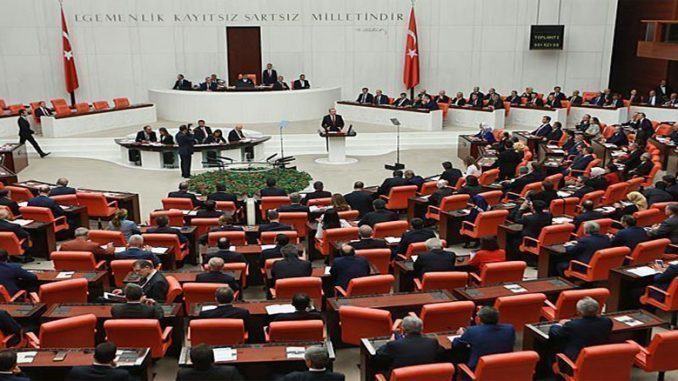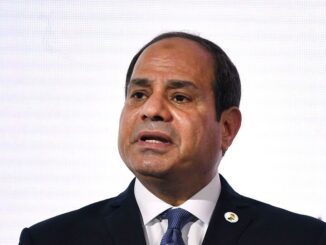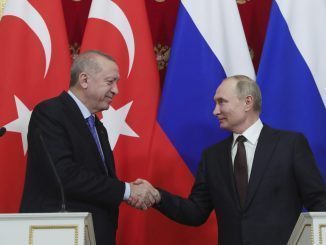
 By: Yasin Aktay*
By: Yasin Aktay*
After all, the Constitution is a social agreement and in order for this agreement to be felt in the complete sense, participation of the people as much as possible is very important. Unfortunately, Turkey’s constitution history is one that is foreign to a constitution that has been prepared in accordance with the spirit of an “agreement.”
As an agreement, constitutions were generally placed in front of the people after coups and functioned as promissory notes that were signed by persuading the people almost at gunpoint or through psychological war tricks. Hence, after the difficulty eased off a little or the trick was realized, a while later, the rising awareness that these promissory notes are invalid turned into a separate psychological complex.
We have been discussing what happened to us in 1982 for 35 years and trying to overcome a complex created in the community as a result of having to give 92 percent vote on such a coup constitution. This is exactly where the complex part of it all is felt. Every effort to overcome it is faced with unexpected opposition and resistances, making it even more complex. For example, the Sept. 12 victims of the first degree being the ones to have strongly opposed the constitution change – which also includes the prosecution of Sept. 12 together with its legacy – had formed one of the most striking examples of the matter. Certain leftists circles that constantly curse Sept. 12 not only took the “We will take our own revenge, is it up to you to settle the accounts of Sept. 12?” stance, when the Justice and Development Party (AK Party) assumed the political burden of such a settlement of accounts, they also opposed the process in a way that made it impossible to ever settle that account.
The constitution change proposal that is on our agenda, is a proposal that is exclusively related to the government system and of course it is not a proposal for a totally new constitution. Because eventually, it is formed with the agreement of two parties. And in this state, in other words, the experience of two parties gathering to work together on a text that is suitable to the people’s expectations, is, on its own, a gain in terms of Turkey’s democracy level.
If only the other parties could also be capable of forming common grounds or if the number of common grounds could be increased or it was possible to work together on existing common grounds. Essentially, standing against coups, terrorism and outside intervention, aligning with democracy, needs to be the minimum responsibility of everybody in terms of developing awareness in matters such as the country’s perpetuity and interest.
Unfortunately, if this is lacking, one party cannot instill this responsibility in the members of another party. Parties need to evaluate these responsibilities among themselves. Reviewing which country’s political party they are, which nation they belong to and how much their policies observe the interests of that nation, is the primary obligation of every party. Essentially, even if the textual content of the deputy oath contains heaps of problems, this is its ultimate meaning and proposition.
The new presidential system’s entire content is out in the open. The greatest gain of this system would be its ensuring the country’s political body integrity and the harmony and coordination between the organs of this political body will be much stronger. The practical result of this is going to be the elimination of ambiguity in administration and stability-related risks.
The AK Party is in power alone in Turkey, hence it has had no issues in terms of stability and determinism to date. However, this has largely been possible as a result of the exceptional acceptance of AK Party leader, President Recep Tayyip Erdoğan, by the people. Insisting on a leader like Erdoğan for so many elections is enough to show what the people want to say. The people want a leader, who does not deceive them at the end of every election, who sees himself as one of the people, with a stance, wisdom, loyalty and humanity as well as successful management, to stay on the job.
The people’s authorization, who gave Erdoğan the credit that no other leader was given before for 15 years, also contains the description of an administration system. For 15 years, the people not only elected Erdoğan, when electing him, they also openly and clearly stated what they want regarding several matters. Those who still fail to understand this are free to struggle in their own ideological obsessions.
A leader that represents a community’s integrity and realizes it is the strongest social asset for a society. This leader brought this country to this level despite the nonexistence of a presidential system.
Even when we consider it independent of Erdoğan, the rise of such leaders within a parliamentarian system is inadequate; and hence, Turkey is never able to put forth a consistent stance and policy together collectively with its state, nation and other organs. If we read Turkey’s century-old political history from this aspect, we will come across hundreds of examples that would confirm this.
To those who say that the proposed presidential system will lead to a sort of union of forces and therefore, give excessive power to the executive and weaken the Parliament, I suggest that they first only face the question of which “separation of forces” principle the current situation is realizing. Isn’t the current system a system in which legislation and execution are physically one and the same as a requirement of the existing parliamentary system? Unlike the parliamentary system, in the presidential system, legislation and execution will be completely separated, the Parliament will be more focused on its actual role – its legislation and supervision role.
In any case, we have a long period ahead of us in which we want to reach fruition; we will further discuss the proposal.
*Yasin Aktay is the vice chair of the ruling Justice and Development (AK Party) in Turkey.
(Published in Yeni Şafak Turkısh newspaper on Monday, Jan. 9, 2017)



